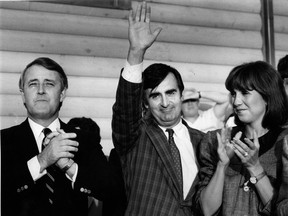“It was a very, very painful rupture that … shouldn’t have happened. But we realized that and we reconciled at the end.”

Article content
It was a decades-long Quebec feud for the ages that had far-reaching consequences for the entire country — and it ended not long before one of the two political giants died.
Close friends from their student days at Université Laval in the early 1960s, Brian Mulroney and Lucien Bouchard were both from small Quebec towns. One a federalist anglophone, the other a francophone nationalist, they both had a flair for oratory and a passion for politics.
Advertisement 2
Article content
Article content
Together, they made names for themselves at a public inquiry into corruption in the 1970s. They entered federal politics together in the 1980s with the Conservative Party, with Bouchard working behind the scenes for Mulroney before running for office himself and becoming a minister.
Mulroney won a massive election victory in 1984, in part thanks to his promise to bring Quebec back into the Constitution “with honour and enthusiasm,” in a speech written by Bouchard.
Their friendship ended abruptly after their bold attempt to bring Quebec into the Canadian Constitution was quashed, setting the country on a course that nearly led to it breaking up.
Bouchard dramatically bolted from the Conservatives to form the separatist Bloc Québécois federal party. He ended up across from Mulroney in the House of Commons, arguing Quebec should leave Canada.
Bouchard eventually became Quebec’s premier, coming within a whisker of taking Quebec out of Canada in the 1995 referendum. By a margin of just 54,288, Quebecers voted No.
The two didn’t speak for decades, with Mulroney reportedly telling friends that if Bouchard showed up at his funeral, the service was to be stopped.
Advertisement 3
Article content
But, after Mulroney’s death at the age of 84 this week, Bouchard revealed the two had recently become close again.
The reconciliation began more than a year ago but intensified over the past few months, with the two speaking regularly by phone and socializing in Florida.
“He was a great friend of Quebec and for me, a personal friend,” an emotional Bouchard, 85, said of Mulroney in an interview with TVA on Thursday.
“We ate together in Florida during the holidays. We spoke last Friday again. We spoke to each other quite often.
“We can’t be 84-85 years old, after the life we lived, without remembering everything that brought us together. We were the greatest friends, a fraternal friendship even. We spent our university years together. Most of my adult life has been together on the same path that we have travelled together.”
Of the feud, Bouchard said: “It was a very, very painful rupture that … shouldn’t have happened. But we realized that and we reconciled at the end.”
Bouchard said Mulroney loved Quebec and tried valiantly to bring the province into the constitutional fold after Prime Minister Pierre Trudeau repatriated the Constitution without Quebec’s approval in 1982.
Advertisement 4
Article content
“There’s a sadness, a nostalgia for the years that were taken from us,” Bouchard said of his falling out with Mulroney.
“It’s not others who took the years away, we took them away ourselves due to our political differences,” he told Radio-Canada. They weren’t benign differences — they were profound convictions on both sides.”
The two met at Université Laval in Quebec City when they were both 20.
Bouchard, who was born in the Lac-St-Jean region, said he initially assumed Mulroney was a rich Westmount anglophone, only to learn that he was born of modest means in Baie-Comeau, on Quebec’s north shore. The two became fast friends.
Recommended from Editorial
Bouchard described Mulroney as a consummate politician and people-person who understood Quebec.
As prime minister, he managed to come very close to changing the course of history with his efforts at political reconciliation, Bouchard said. Even Parti Québécois Premier René Lévésque believed in Mulroney, he added.
Advertisement 5
Article content
“He had a very humanist vision of the Canadian federation,” Bouchard said. “He believed that Quebecers could take their place within it, provided that we respect them, that we understand them, that we allow them to keep their identity.”
In 1987, Mulroney negotiated the Meech Lake Accord, which would have recognized Quebec as a “distinct society” and given the province an effective veto over major constitutional amendments.
“It would have changed things,” Bouchard said.
Without elaborating, he added: ”We wouldn’t be in the situation we are in today.”
Describing the accord as a “major achievement,” Bouchard said Mulroney managed to get the country behind the deal.
But it fell apart because provinces had three years to ratify it, and, in the meantime, some political actors had changed. The agreement died in 1990, leading to Bouchard abandoning the Conservative government.
“It was English Canada that broke Meech Lake, it wasn’t Brian Mulroney,” Bouchard said.
But the sense of betrayal led Bouchard to found the Bloc.
“We found ourselves face-to-face. You can’t stay friends when you’re political opponents,” Bouchard said. “Our friendship went into a period of mourning that lasted about 30 years.”
Advertisement 6
Article content
Related
Advertisement 7
Article content
Article content





